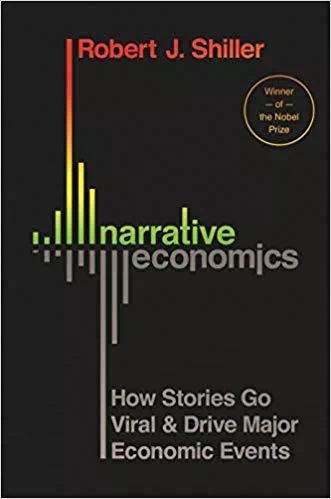If you are a business person, one of the most important questions is to figure out, “How do you tell what you are doing?”
Editor’s note: This article is from WeChat public account “Red Sequoia” (ID: Sequoiacap), author Hong Shan. Authorized to reprint.
For every entrepreneur and business, in terms of creating quality products, satisfying users’ expectations, and providing comprehensive services, it is also important to tell what the company is doing. A true, engaging story can make your product more effective and user-friendly. Narrative is not the same as telling a story. It is not a myth that creates a hole in the wind, but a real excavation of the meaning of what you are doing and telling users who have the same values.
Robert J. Shiller, winner of the 2013 Nobel Prize in Economics and Professor of Stirling at Yale University, in his new book Narrative Economics: How Stories Go Viral and Drive The importance of narrative is emphasized in Major Economic Events. The book uses a large number of historical cases and data to analyze the narrative reasons behind the epidemic that affects economic behavior and how managers correctly describe what the company is doing.
Narrative Economics
How Stories Go Viral and Drive Major Economic Events
Robert J. Shiller / with
Princeton University Press October 2019
If you are a business person, one of the most important questions is to figure out, “How do you tell what you are doing?”
The story is how we understand the world and understand each other, so how to tell it is an important issue. It’s hard to imagine any business leader or business – if you can’t answer the question “Who are we? What do we do? How do we want the world to look at us?”
This is not just a general knowledge of business, it has entered the field of academic economics, and Yale University economist Robert Schiller’s new book Narrative Economics is exploring this issue. Schiller’s research spanned multiple disciplines, broke many existing traditional ideas, and explored the role of narrative in explaining “how quickly stories spread and promote major economic events.”
Robert J. Shiller
2013 Nobel Laureate in Economics, Professor of Stirling Economics at Yale University
The narrative itself is indispensable for understanding economics, and even through narrative it can understand all other economic concepts.
Most executives and entrepreneurs may think this is a commonplace topic, and if you think Schiller is just “old pots of new wine,” then you get it wrong. The “narrative” he explores is not just a “story.” The terms “narrative” and “story” are often used interchangeably, but according to the Webster online dictionary, narrative is “a way of presenting or understanding a situation or series of events to reflect and promote a particular perspective. Or values.” This is deeper, more essential, and broader than the story.
People need narrative. In Schiller’s view, this is an important way to give meaning to what we are doing, and it is also an important characteristic that distinguishes people from other animals. Social media and global connectivity have fundamentally democratized narratives and expressions, making it harder for companies to control their stories than ever before. When a story pops up and spreads like a virus, it is shaped into a specific version of reality. The final form of the story becomes impossiblecontrol.
Schiller said: “We can think of history as a series of rare and major events, one of which is widely spread, usually (but not always) because of the attractive celebrities (even It’s just a blessing of a little fame or even a fictional character, and it adds to the interest in this story.”
For the company, telling is a double-edged sword. You or your product may be able to achieve rapid success with great success, but you need to be vigilant. This success is sometimes just a flash in the pan. When it comes to an error, it can be as fast as the user. Wanting to achieve lasting success like Apple requires additional support in addition to telling.
Why are some narratives widely spread and concerned? On the one hand, if the narrative can obtain the influence of influential people and powerful visual images, it will help spread; on the other hand, it is thought-provoking that the authenticity of the narrative itself does not seem to play a role in the process of communication. Important decision.
Schiller believes that narrative can achieve viral transmission, and the power behind it is mysterious. “The occurrence of a major event is actually caused by a seemingly unrelated mutation in the narrative, which has a high infection rate. At the same time, with a low forgotten rate, or some first-mover effects make a group of competing narratives seize the opportunity.”
Think about the rise of the trolley case. Schiller wrote: “Until the 1990s, when Northwest Airlines pilot Robert Plath invented a solid handle with two wheels and a foldable handle, the trolley case became popular.”
In fact, this promotion process is lengthy: as early as 1887, a similar product appeared and applied for a patent; in 1951, an article by John Allan May also described his manufacturing and manufacturing since 1932. Efforts to sell wheeled suitcases; in 1972, an early version of the Bernard Sadow wheeled suitcase was born, but only with limited recognition. It wasn’t until the crew accepted the suitcases on a large scale and pulled them through the airport in a gorgeous way.
Why didn’t the trolley case get popular earlier? Has the development of society, technology and commerce also played a certain role? There is a plausible narrative here: the rise of the trolley case just caught up with the growing era of global business travel, more and more female passengers travel by air, they often bring a lot of travel items, in order to deal with this problem, Light travel – with carry-on baggage – becomes necessary. As a result, airlines began charging for checked baggage, and passengers began to favor portable suitcases that were more portable.
In business logic, this is based on as much experience, observation, and inference as possible, and it is critical to decide whether to bring a product to market. It’s no exaggeration to say that business leaders make a living by predicting and influencing the narrative process, regardless ofHow unpredictable these narratives seem. Schiller wrote: “The economic narrative is an infectious story that has the potential to change the way people make economic decisions, such as deciding whether to hire a worker at this time or wait for other better opportunities, be risky in business transactions, or Be cautious, start a business or invest.”
The narrative is a story about what you are doing. It requires imagination and telling power. Some people are very good at giving things something, but at the same time, some meaning of human creation may be a trap. Because many things in the world are like some naturally occurring Rorschach inkblot tests, they happen, but they don’t make much sense.
In short, managers must be vigilant and cautious about narratives and avoid “over-brain supplements.” People are naturally tempted by self-hypnosis or other people’s stories. So, be sure to ask yourself, “How do you tell what you are doing?” But the problem cannot be stopped. You still need to judge whether the story really describes what happened, or just describes your thoughts. It is better to go further and ask others: “Do you see what I have told you?”


